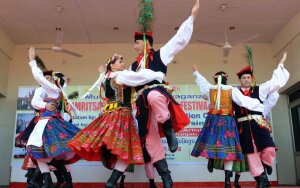- November 30, 2012
- 443
National Communities Council is protection against provocations. On 10th December a new chairman is to be elected

On 10th December there will be elections for a new chairman in The National Communities Council, which is associated with the Lithuanian Ministry of Culture. Representatives of Polish community think that the post of chairman should belong to a Polish person, but it is rather impossible, as, in their opinion, The Council is not proportional.
“Why is it impossible for a Pole to be elected a chairman? Because there is too few of us. Some groups do not want the Council to be led by traditional national minorities in Lithuania. Other nationalities make agreements and choose their own representatives.”— told PL DELFI Grzegorz Sakson, the chairman of the Polish Lawyers Association in Lithuania, who was appointed a member of the Council by organisations representing Poles in Lithuania.
Mock institution?
In the opinion of Edward Trusewicz, who is an alderman in Vilnius and who represented the Polish community in the Council in the previous term of office, The National Communities Council is rather a mock institution. “I don’t think that The Council, in its present form, makes any sense. I treated Poles’ participation in it as a form of protection against certain provocations”— he shared his impressions with PL DELFI.
A problem of The Council is, in his opinion, that representatives of smaller communities do not understand the postulates of traditional minorities (such as schooling in a mother tongue) well. For them, The Council has had more friendly and unofficial character, and they limited themselves to a few events in a year. Another problem is that the leaders of The Council have not had the best relations with The Ministry of Culture. “Obviously, it had an influence on The Council’s work.”— believes Trusewicz.
As he says, The Council has managed to accomplish a few things. “The works on a project of a new Bill of national minorities can be counted as a success. Eventually, the Bill was not introduced, for various reasons. Political will was missing. But The Council had sent its representatives to the working team that was preparing the project of the Bill, and I participated in the works, too”— informed Trusewicz.
Sakson, to some extent, agrees with his colleague’s opinion. “It is an advisory institution, but the Minister has to heed its opinions. And if he wants to reject our proposals, he has have to present serious arguments for that.”— said Grzegorze Sakson.
Gamzajew: Poles have many ways of making themselves heard
A former chairman of the Council, Mahir Gamzajew, does not agree with the representatives of the Polish community. “With regards to the proportionality, it depends on how you look at it. If we take it as the Poles want it to be, then the UN Secretary would always have to be a Chinese person. Because there is so many of them. And despite that, the current Secretary is Japanese. The Poles have many ways to make themselves heard. They have their political party, their organisations and MPs.”— told PL DELFI Gamzajew. In his view, Polish representatives want to make The Council political.
In The Council, there are representatives of Poles, Russians, Belarusians, Jews, Roma people, Germans, Tatars, Karaim people, Latvians, Chechens and even Lebanese people. In total, The Council represents 18 nationalities and has 24 members.
A minority that has over 100.000 people has 3 representatives in The Council. A minority with 10.000—100.000 people has 2 representatives and one having less than 10.000 people- 1 representative.
The members of The Council participate in various governmental commissions and working teams, they assess legal acts, help to solve various problems associated with national minorities. They also assess projects related to activity of national minorities.
Tłumaczenie Emilia Zawieracz w ramach praktyk w Europejskiej Fundacji Praw Człowieka, www.efhr.eu. Translated by Emilia Zawieracz the framework of a traineeship programme of the European Foundation of Human Rights, www.efhr.eu.

